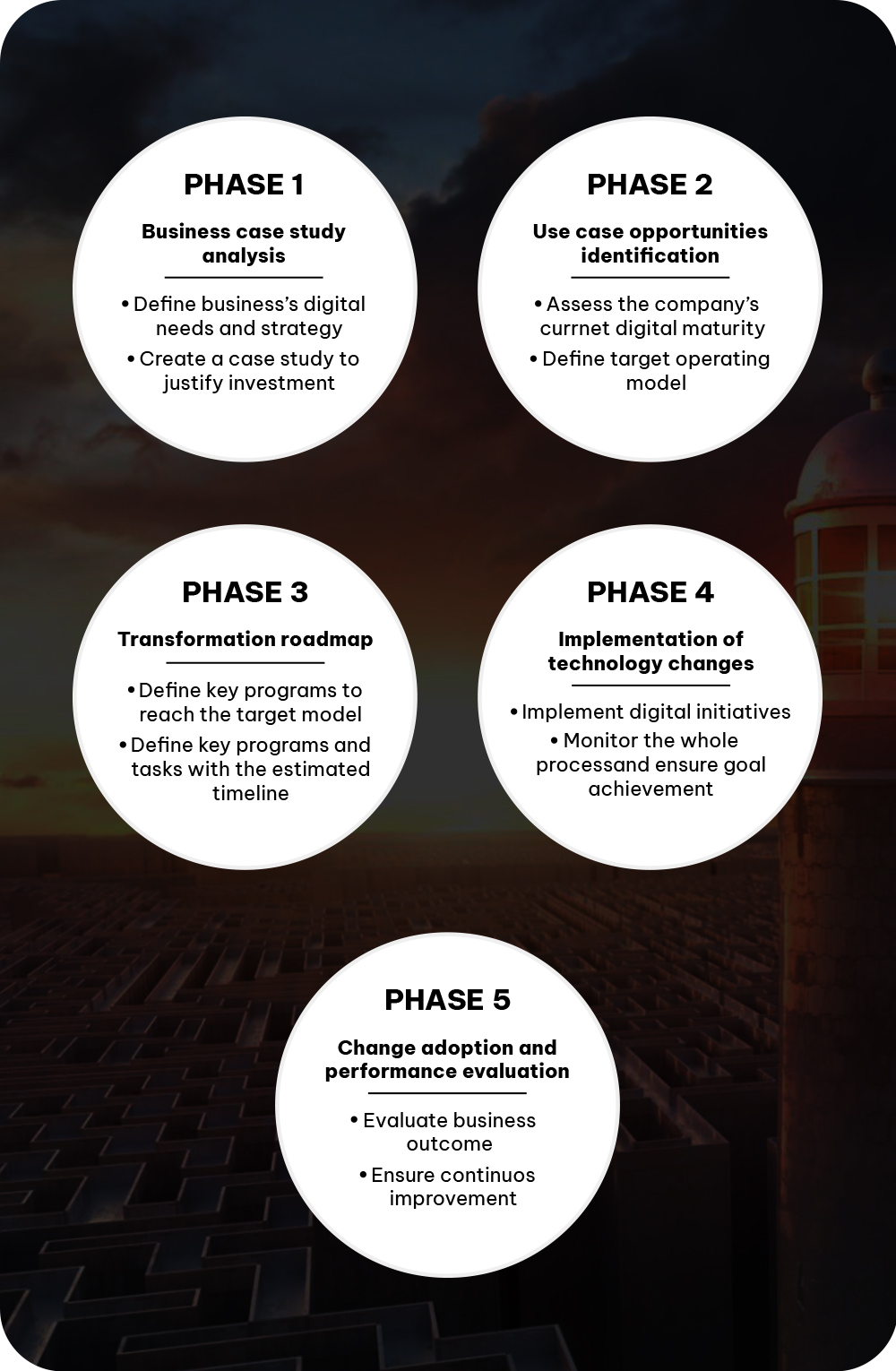Digital Strategy Consulting
Tailor a roadmap that optimizes budget and yields digitally-driven impacts
Tailor a roadmap that optimizes budget and yields digitally-driven impacts
Tailor a roadmap that optimizes budget and yields digitally-driven impacts
GEM’s digital strategy consulting service delivers actionable insights and tailored strategies that leverage cutting-edge technologies.

We analyze your current digital infrastructure to identify strengths and areas for improvement. Then our team develops a clear digital strategy for integrating advanced technologies that align with your business goals.

GEM designs bespoke digital solutions that address your specific business challenges, focusing on scalability, flexibility, and seamless integration with your existing systems.

GEM leverages our expertise in AI and Robotic Process Automation (RPA) to help your business reduce manual workloads and drive innovation with intelligent automation.

We provides expert advice and insights on employing best practices in cybersecurity within your digital strategy.
As a result, GEM ensures that your systems comply with industry standards and regulations while protecting critical data.
With GEM’s comprehensive transformation framework, you swiftly develop and implement advanced business models and open new horizons of opportunity.


GEM’s digital strategy consulting service helps businesses lower operational costs by up to 50% while improving system scalability.
Our recommended tools and practices allow businesses to make faster, more informed decisions, improving overall productivity and strategic agility.
Our clients benefit from a strong foundation for long-term success that GEM builds by incorporating advanced technologies and practices.
GEM helps global businesses realize a marked reduction in security risks and effectively safeguard critical data.



We will reach out shortly via Email or WhatsApp/Kakao Talk/Line/Viber
Digital strategy consulting helps organizations structure their digital priorities, align technology with business goals, and make decisions that drive measurable results. It connects leadership, operations, and customer experience through a unified roadmap, shaping how businesses grow, compete, and adapt. In this article, we’ll look at the core elements of digital strategy consulting, the outcomes it delivers, and how to evaluate potential partners. Let’s start with what this approach actually involves.
Digital strategy consulting is a structured approach to aligning technology initiatives with broader business objectives. It involves assessing current capabilities, identifying opportunities for digital innovation, and developing a roadmap that connects business outcomes with the right tools, processes, and talent.
Unlike traditional IT strategy consulting, which often focuses on infrastructure or systems integration, digital strategy consulting looks at transformation across the entire organization, spanning customer engagement, operations, data, and revenue models. It integrates elements of business technology strategy, helping organizations navigate not just what to implement, but why, when, and how to execute at scale.
Explore more: The future of consulting
Digital strategy has become a core driver of business performance. As customer expectations shift and markets become more data-driven and tech-enabled, companies need clear direction on how to prioritize digital investments. Without a unified strategy, digital initiatives risk becoming fragmented or misaligned with long-term goals.
A well-defined business technology strategy helps organizations focus on value creation, whether through new product offerings, omnichannel experiences, or operational efficiency. In this environment, digital strategy consulting provides an outside-in perspective and a structured framework to make confident decisions, respond to disruption, and build a foundation for sustainable growth.
Digital strategy consulting consists of several aspects. Whatever change is applied following the consulting will likely impact the whole organization.
Every initiative should be grounded in business intent. This means aligning digital strategy with long-term objectives, operational priorities, and market positioning. Consulting partners work with leadership teams to identify where digital capabilities can reshape existing models, whether by creating new revenue streams, changing how services are delivered, or rethinking customer value. Business model evolution is not about technology adoption alone; it’s about redefining how the business operates in a digital-first environment.
Technology becomes a lever for growth only when it’s deployed in the right context. This includes evaluating current systems, identifying gaps, and designing scalable architectures across cloud, data, and application layers. Transformation may involve cloud migration, application modernization, or adopting AI-powered tools, but it all depends on the organization’s goals. The consulting process ensures that technology choices are not just modern, but relevant and sustainable.
Digital strategy must reflect how customers interact with the brand. This involves mapping customer journeys, identifying friction points, and designing digital experiences that are intuitive, personalized, and consistent across channels. From mobile platforms to self-service portals, the focus is on creating meaningful interactions that drive loyalty and increase lifetime value. Consultants help define experience metrics and recommend tools to deliver on those expectations.
Organizations need to move from reactive reporting to proactive insights. Data strategy consulting focuses on building the right infrastructure, such as data lakes, warehouses, and analytics platforms, to support real-time, cross-functional decision-making. It also involves defining governance models and embedding analytics into daily workflows. The goal is to turn data into a business asset that informs strategy and supports continuous adaptation.
Transformation is rarely just a technology challenge. Success depends on whether teams are prepared to adopt new tools, processes, and ways of thinking. This requires clear communication, leadership alignment, and a plan for upskilling or restructuring. Consulting partners help organizations identify capability gaps, design training programs, and embed change into the culture to improve adoption and long-term impact.
Digital customer acquisition and retention strategies are central to growth. This includes optimizing marketing channels, improving digital storefronts, and equipping sales teams with the data and tools they need to convert leads. A consulting engagement typically addresses content strategy, platform selection, and performance tracking, resulting in more coordinated and effective demand generation efforts.
A digital strategy is only as good as its outcomes. Consultants help define metrics tied to business goals, set up dashboards, and establish processes for ongoing evaluation. This includes reviewing technology performance, customer engagement, and operational efficiency. With the right feedback loops in place, businesses can identify what’s working, make adjustments quickly, and scale successful initiatives.
Digital strategy consulting service providers offer significant advantages to businesses throughout the whole operation and in the long term as well.
Increase Revenue and Profitability
Digital strategy consulting helps identify untapped growth opportunities – through new digital products, channel diversification, or better customer segmentation. For instance, a retailer might discover that shifting its focus to mobile-first commerce could drive higher conversion rates. By aligning investments with revenue potential, businesses are able to generate returns faster and more predictably.
Improved Operational Efficiency
Through better process design and targeted automation, organizations can eliminate redundancies and streamline workflows. A logistics company, for example, might use digital tools to track shipments in real time and automate manual reporting, improving service delivery while lowering costs. Consultants bring an outside-in perspective to highlight inefficiencies that internal teams may overlook.
Increase Competitive Advantage
When strategy is built on data and executed with agility, companies are better positioned to differentiate. This can mean faster go-to-market cycles, more relevant customer experiences, or proprietary digital assets. A manufacturer that invests in predictive maintenance or IoT-based quality control gains an edge in uptime and consistency – factors that directly impact customer satisfaction and retention.
Greater Agility and Adaptability
Markets change quickly. Digital strategy consulting helps businesses build flexible architectures and decision models that can respond to shifting demand, regulatory changes, or new technologies. For example, in a fast-moving consumer goods company, having a modular tech stack and real-time inventory insights can support rapid product launches or supply chain adjustments without disrupting operations.
Better Decision-Making
With the right data infrastructure and governance in place, leadership can move from intuition-led to evidence-based decisions. Consultants help define which metrics actually matter, how to track them, and how to interpret trends. This creates a culture where decisions are faster, more consistent, and tied to measurable outcomes in marketing, finance, or product strategy.
Identifying the consulting partner that fits your business starts with clarity on what outcomes you’re targeting. Not all advisors bring the same mix of experience, delivery approach, or technical depth. These six areas can guide your evaluation:
Look for advisors who understand your market conditions, customer behaviors, and operating models. Experience in similar sectors means they’re more likely to recognize patterns, anticipate challenges, and propose options that apply to your situation. For example, a partner who has worked with regional banks may already know how to navigate compliance-heavy environments while modernizing customer channels.
Some firms focus heavily on planning, while others are more execution-driven. It’s more effective to work with a team that can do both. Review how they turn digital roadmaps into real programs, and whether they’ve supported clients through implementation phases such as platform deployment, process redesign, or capability building.
Digital strategy often links multiple functions – product, marketing, IT, operations, and finance. A qualified partner brings a team that can operate across these areas and connect business goals with technical decisions. This prevents fragmentation and helps leadership teams stay aligned as priorities evolve.
Ask for examples of work with businesses of similar size or complexity. Pay attention to how they define success and what measurable improvements they’ve made—such as faster launch cycles, better customer retention, or improved cost discipline. Direct conversations with past clients can clarify how the firm works and what to expect.
Some firms bring top-down models that rely on long timelines and static reports. Others use shorter, iterative formats that involve internal teams early and often. Consider how the group collaborates, how they transfer knowledge, and whether they’re prepared to work with your internal pace and decision-making approach.
Digital initiatives often span multiple departments and investment areas. A consulting team should help define what success looks like, how it will be tracked, and how decisions will be adjusted when goals shift. This includes setting baselines, identifying leading indicators, and building feedback loops into the process.
A consulting relationship works best when there’s alignment on scope, pace, and mutual accountability. While credentials matter, the way a partner approaches each phase of the engagement often has a stronger impact on outcomes.
GEM Corporation is a global IT service provider and consultancy that partners with organizations to translate bold ideas into business-ready digital solutions. Since 2014, we’ve delivered over 300 projects across markets in APAC, ANZ, EU, and the US, backed by a team of 400+ technology experts. Our approach combines deep technical capabilities with a pragmatic understanding of business priorities, helping clients shape outcomes that matter.
Our digital strategy consulting service is built to help organizations navigate complexity and make confident decisions in an evolving tech landscape. We begin with a thorough assessment of your current digital infrastructure, identifying strengths, inefficiencies, and areas of opportunity. From there, we develop a customized roadmap that integrates advanced technologies, such as AI & automation, and modern data platforms, into your business model. We also provide guidance on cybersecurity and compliance, ensuring that digital initiatives are not only forward-looking but secure and aligned with industry standards. With a focus on execution, scalability, and measurable impact, GEM helps clients optimize investment, streamline operations, and lay the groundwork for long-term growth.
Moreover, GEM provides support in integrating ServiceNow services into enterprises.
Digital strategy consulting gives organizations a structured way to align technology with business goals, improve operations, and respond to shifting market demands. It connects strategy with execution, through clear roadmaps, modern architectures, and practical tools for data, automation, and customer engagement. With the right partner, digital initiatives move faster and deliver outcomes that are measurable and sustainable. Contact GEM to explore how we can help structure your next digital move.
